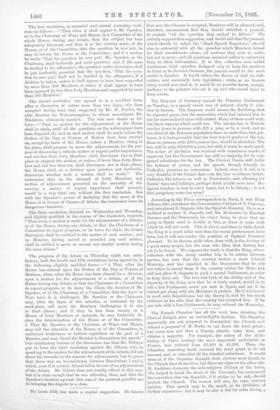The second resolution was agreed to in a modified form,
after a discussion of rather more than two days,—the form accepted having been that suggested by Mr. H. Fowler, the able Member for Wolverhampton, to whose amendment Mr. Gladstone ultimately acceded. The rule now stands as fol- lows:—" That no motion for the adjournment of the House shall be made, until all the questions on the notice-paper have been disposed of; and no such motion shall be made before the Orders of the Day or Notices of Motion have been entered on, except by. leave of the House, unless a Member, rising in his place, shall propose to move the adjournment, for the pur- pose of discussing a definite matter of urgent public importance, and, not less than forty Members shall thereupon rise in their place to support the motion, or unless, if fewer than forty Mem- bers and not less than ten shall thereupon rise in their places, the House shall, on a division upon question put forthwith, determine whether such a motion shall be made." The concession that on the demand of forty Members, any motion of adjournment grounded on the necessity of dis- cussing a matter of urgent importance shall proceed, would be a very fatal one, without the first resolution. But with the Speaker's power of declaring that the sense of the House is in favour of Closure of debate, the concession loses its
dangerous character.


































 Previous page
Previous page